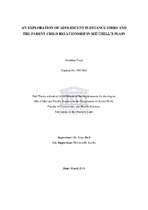| dc.description.abstract | Adolescence is a stage in a young person's life between childhood and adulthood and is
characterized by rapid, intensive life changes and adaptations. During this stage, the parentchild
interaction is vital, as it helps the adolescent to make informed decisions in life. The
aim of this current study is to explore the parent-child relationship of adolescent substance
users, aged between 14 and 17 years, and their parents, specifically mothers.
The researcher chose to utilize a mixed methods approach, consisting of both qualitative and
quantitative methods of data collection and analysis, to gather comprehensive evidence. A
sequential exploratory mixed methods design was selected for the study. Data was collected
by means of self-administered questionnaires and semi-structured interviews. Purposive
sampling was used to select the 45 adolescent substance users and their 45 mothers, as
parents, from the community of Mitchell's Plain. A further sample of 5 willing adolescents
and their 5 mothers was selected randomly to participate in the semi-structured interviews, to
further probe the nature of the parent-child relationship.
The Attachment Theory was employed as a theoretical framework. The Statistical Package
for Social Sciences (SPSS) programme, version 25, was used to analyse the quantitative data.
Descriptive statistics, Pearson's correlation and independent tests were applied to the data.
The findings of this study revealed that the majority of the respondents had different
perceptions of the parent-child relationship. The thematic analysis was used for qualitative
data and the data was analysed by making use of the qualitative analysis stages as guidelines
to identify the main themes that emerged from the data. Confidentiality and anonymity was
maintained throughout the study.
There were significant differences and similarities on the perceptions of both the parents and
adolescent substance users. They agreed on what the parent-child relationship is, as well as
how a parent should interact with the child; however, there were differences on how they
perceived their relationship with each other, regarding the different components of the parentchild
relationship. Recommendations are provided for parents and children on positive
parent-child relationship, future research, intervention programmes and policy development. | |

